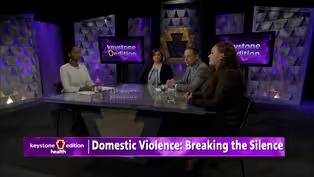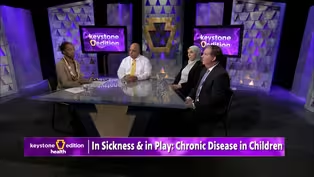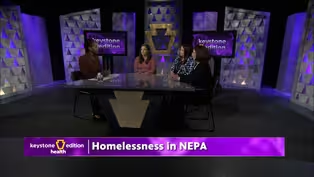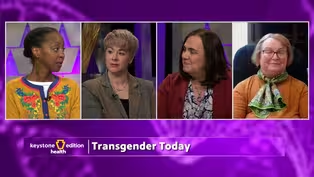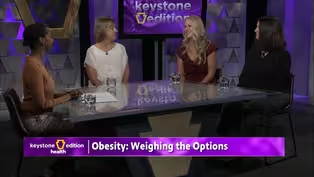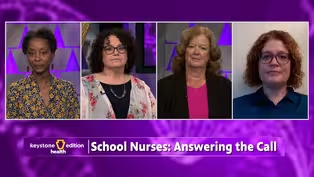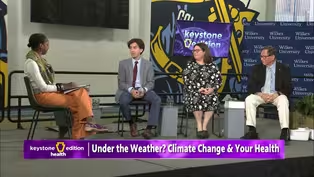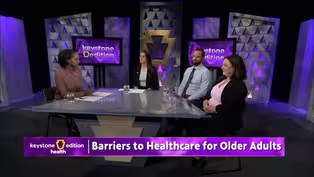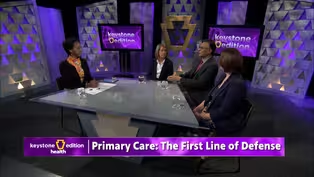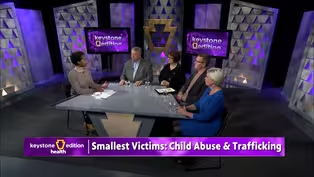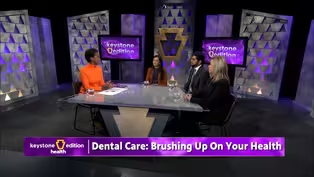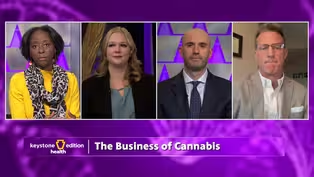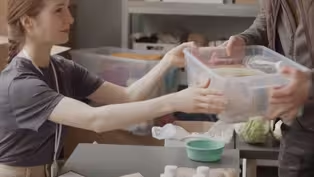Keystone Edition
Fighting Food Insecurity
5/23/2022 | 27mVideo has Closed Captions
See ways to continue fighting food insecurity and improve the health of PA residents
Lack of access to reliable, nutritious meals can increase an individual's risk of chronic disease and lead to poorer overall health. In 2020, Feeding America found 1.77 million Pennsylvanians experienced food insecurity, but they anticipate a decline in that number for 2021 thanks to policy changes and increased private sector generosity over the course of the pandemic.
Problems playing video? | Closed Captioning Feedback
Problems playing video? | Closed Captioning Feedback
Keystone Edition is a local public television program presented by WVIA
Keystone Edition
Fighting Food Insecurity
5/23/2022 | 27mVideo has Closed Captions
Lack of access to reliable, nutritious meals can increase an individual's risk of chronic disease and lead to poorer overall health. In 2020, Feeding America found 1.77 million Pennsylvanians experienced food insecurity, but they anticipate a decline in that number for 2021 thanks to policy changes and increased private sector generosity over the course of the pandemic.
Problems playing video? | Closed Captioning Feedback
How to Watch Keystone Edition
Keystone Edition is available to stream on pbs.org and the free PBS App, available on iPhone, Apple TV, Android TV, Android smartphones, Amazon Fire TV, Amazon Fire Tablet, Roku, Samsung Smart TV, and Vizio.
Providing Support for PBS.org
Learn Moreabout PBS online sponsorshipMore from This Collection
Healthcare is constantly changing as technology finds new and better ways to help people live longer, healthier lives. Host Tonyehn Verkitus will address the issues that are important to the people in our community, including the ongoing pandemic, concerns about vaccines, food deserts, childhood trauma and child abuse, mental health, environmental issues, and the rising cost of staying healthy wit
Domestic Violence: Breaking the Silence
Video has Closed Captions
Access to the right resources can make facing this challenge a little easier for families (26m 59s)
In Sickness and in Play: Chronic Disease in Children
Video has Closed Captions
About 25% of children in the US aged 2 to 8 years have a chronic health condition (27m)
Video has Closed Captions
Homelessness can happen to anyone at any age or socio-economic status. (26m 59s)
Video has Closed Captions
As we raise the visibility on Transgender young adults and embrace them within our culture (26m 59s)
Video has Closed Captions
Obesity is a serious risk factor many try to avoid when developing healthy eating habits. (27m)
School Nurses: Answering the Call
Video has Closed Captions
What can our school districts do to help retain and recruit nurses for future generations? (27m)
Under the Weather? Climate Change & Your Health
Video has Closed Captions
How does climate change impact individual and public health? (54m 59s)
Barriers to Healthcare of Older Adults
Video has Closed Captions
What progress have local organizations made in addressing these challenges? (27m)
Primary Care: The First Line of Defense
Video has Closed Captions
When was the last time you saw your primary care doctor? (27m)
The Smallest Victims: Child Abuse & Trafficking
Video has Closed Captions
What are the signs to know to spot child abuse and even possible trafficking? (27m)
Dental Care: Brushing Up on Your Health
Video has Closed Captions
How can providers make dental care more affordable and accessible? (26m 59s)
Video has Closed Captions
What does the cannabis industry mean for Northeastern and Central Pennsylvania? (26m 59s)
Providing Support for PBS.org
Learn Moreabout PBS online sponsorship- [Announcer] Live from your public media studios, WVIA presents "Keystone Edition Health," a public affairs program that goes beyond the headlines to address issues in Northeastern and Central Pennsylvania.
This is "Keystone Edition Health."
And now moderator Tonyehn Verkitus.
- Good evening and welcome to "Keystone Edition Health."
I'm Tonyehn Verkitus, thank you for joining us.
Depending on where in our region you live, your access to consistent healthy food may be limited.
Tonight, we'll discuss both the traditional and innovative ways members of our community are helping to fight food insecurity, but first WVIA's Paul Lazar has more.
(air whooshing) - [Paul] Lack of access to reliable nutritious meals can increase an individual's risk of chronic disease and lead to poor overall health.
In 2020, Feeding America found 1.77 million Pennsylvanians experienced food insecurity, were a lack of consistent access to a sufficient quantity of affordable, nutritious food.
But Feeding America anticipates a decline in that number for 2021, thanks to policy changes and increased private-sector generosity over the course of the pandemic.
In Northeastern and central Pennsylvania, standbys like food banks continue to find ways to combat food insecurity through pantries and fresh food programs, while other nonprofits like The Greenhouse Project are working to educate communities about ways to grow and access fresh produce.
For "Keystone Edition Health," I'm Paul Lazar.
- Joining us tonight, we have Jane Risse, Executive Director of The Greenhouse Project.
Chrissy Manuel is Director of Community Revitalization for United neighborhood Centers of NEPA, and Karel Zubris Nutrition Education Advisor with Penn State Extensions Nutrition Links.
Thank you all for joining me, I'm really excited about this conversation because A, I love to garden, so The Greenhouse Project, exciting, and I love food.
(laughs) So Jane, let me start with you.
- Sure.
- I'm obviously familiar with your program, I used to be on the board so I can't plead ignorance, but I would love if you'd share a little bit about the community gardens, this is the time of year that we're beginning to plant, how can people get involved with your community gardens and what areas do they serve?
- Terrific, yeah, we have two community gardens in the hill section of Scranton.
We have about 40 families, typically, that are subscribed and are gardening.
We usually have them full but to get involved and to help, we love volunteers and we have classes that we teach.
So it's a great way to meet your neighbors and to learn about gardening through our classes there.
- And then Chrissy, you're at the other end of the spectrum, you have the food markets, you have two, I believe, can you tell us a little bit about that?
- Sure, so United Neighborhood Centers has two farmers' markets right now, one in south Scranton, and that's been operating since 2010, and it's been a year-round market since about 2016.
So we have that in South Side and then we just started a new market in Carbondale last year.
So now we're representing both communities and they're both here around farmers' markets.
- And then you are doing the end product, working with folks, teaching them about nutrition and what to do with foods, can you tell me a little bit about the program?
- I work with Penn State Extension Nutrition Links Program.
We offer research based nutrition education programs to our eligible participants.
Right now millions of Americans struggle every day to make ends meet.
Our goal at Nutrition Links is to help our participants learn to eat healthy foods on a limited budget.
Our lessons are taught in small groups, in person and virtually, our variety of teaching methods, including hands-on food preparation, and that's what we do with the expanded food network.
I reach out to local community centers, I work with the Hazleton Integration Project, the Wilkes-Barre School District, I worked with the SNAP-Ed Program in Lackawanna County with Chrissy.
So we've partnered together and joined forces in order to reach our participants and help them about food safety, budgeting, making ends meet.
And it's a great way for us to help the community right now when the need is so great.
- And how long has this program been around?
Because prior to speaking to you, I didn't even know it existed.
- A lot of people have not heard about Penn State Extension Nutrition Links and the expanded food and nutrition program known as EFNEP, and it's celebrating over 50 years in Pennsylvania.
EFNEP is the federal program through the land grant universities in every state.
The Pennsylvania State University, AKA Penn State, is a land grant university who administers the EFNEP in Pennsylvania.
For over 50 years, our educators like me, we use the land grant university that have brought EFNEP to us, the expanded food and new nutrition education program to Americans, we bring these programs to everyone who has a limited resource, giving 'em the tools that they need to use for better eating and better health.
- So SNAP was mentioned, folks can use SNAP at the farmers' markets?
- Yes, yes.
- Okay.
- Yes, and it's actually really exciting.
We launched our SNAP program in 2016 in South Side, So we hadn't been able to accept that prior to that.
So we launched it in 2016, and then in 2019 we expand it to what we call Double Produce Dollar program.
So up to $20 a week, SNAP recipients can double their dollars.
So it's just refresh produce, so you can use your SNAP benefits, which you can buy anything in the grocery store, meats, eggs, we have cheese, fresh produce, honey, things like that, and then you get the fresh-produce dollars for up to $20 a week.
So it's really nice, we have families who use $20 every week, so they essentially double $80 a month and make it $160.
So when we opened Carbondale within the first two months we had implemented the program up there as well.
- Do you know if this is something that a lot of farmers' markets do?
Because it seems to me that it would be a great benefit for people who are using staff, and for folks who don't know, can you say what the acronym stands for, SNAP.
- Supplemental Nutrition... Oh, I forget the A.
- Oh, I'm sorry.
- That's okay.
(panelist laughing) It's Assistance Program, Supplemental Nutrition Assistance Program, sorry about that.
Yup, so it's formally known as Food Stamps, a lot of people will still call it Food Stamps, but you can use it for basically any food, any of the fresh food at the market.
The only thing you can't use it on is for hot food, hot coffee, things like that.
Yeah, so it's great, so people can use it for most of what we have at the market.
And another thing that a lot of people don't know is you can use it for food-producing plants.
So your tomato plants, you can use your SNAP dollars for that, which is really nice.
So we like to bring in a lot of, like, we brought in The Greenhouse Project and they can come in and people can use the SNAP when they're purchasing those plants.
- Speaking of growing plants, I know that you have a teaching garden behind the Greenhouse Project, can you tell us a little bit about that?
- Sure, we're just getting them set up.
We just filled soil the other day, we have some wooden raised beds, couple of different heights, some on the ground that actually you helped us build many years ago.
And we have some that are taller for ADA accessible.
And we just filled them with soil this week.
And so the first Saturday of each month, at noon, we do a demonstration of some kind in a teaching, and people can just drop in at noon and we'll go over that.
We'll be planting all sorts of vegetables and fruits and well, yeah, fruit and herbs, all kinds of things, in those gardens, taking care of them all season.
And we used them also for our gardening classes.
And yes, Chrissy was good enough to offer us a spot at the farmers' market on Saturday, where we brought down a lot of tomato plants and pepper plants and all the food plants that we have that we grow organically, many heirloom varieties of tomatoes, for those tomato lovers out there that we have for sale.
And we also donate a lot of those to other, like school gardens and community gardens, church gardens, things like that to help with hunger issues.
- Now, for people who don't know, can you explain what an heirloom tomato is?
- Yes, well, generally it's referred to as a plant that's over 50 years old and growing in a certain region.
And you can save the seeds.
The beauty of an heirloom variety is you could save seeds and reproduce 'em and grow them yourself.
And we often teach seed-saving classes.
You know, if you're that kind of person or you could just come by the plant starts at a greenhouse and get a jumpstart on the season.
- Now, I know that a lot of the programs you offer, not just the farmers' market, are based on responding to social determinants of health, can you talk a little bit about social determinants of health so people know what that is and then other programs as well?
- Sure, so as part of the work that I do, I'm part of the larger agency, United Neighborhood Centers, and we are social service agency so we're always thinking about the social determinants of health, such as food security, housing security, transportation, stable employment, and just how safe is the community where you live?
Can you get to a grocery store?
Things like that.
So there's this just kind of holistic like group of determinants that really do determine what your health outcomes will be.
So for example, with the farmers' market, what happened in 2016 is a large supermarket that was in South Side closed, and because of that we knew that people were gonna have a hard time getting fresh, healthy food, especially fresh produce, so we became a year-round farmers' market.
But other programs that we offer, we have our Community Services Department which has a food pantry, which we often have fresh produce there as well.
We work to combat housing and security by working at eviction prevention, utilities assistance, things like that, but then we also work for families, we work with childcare, youth programming, youth arts programming, we have older adult centers.
So we work with people of all ages and do all different kinds of programming to improve the health of individuals.
- You mentioned the food pantry, about how many individuals would you say you serve annually?
- Well, I believe last year we served about 4,000 individuals and probably 31...
I believe it was 31,000 individual services because we will see families, we don't put any limits on how often people can come, so they can come every day, every week, every month, whatever the need is.
We assume if someone is coming for a bag of food, we wanna provide that, yeah.
- Food banks and food pantries have long been on the front lines of any fight with food insecurity.
WVIA spoke with the Central PA Food Bank to learn how their programs have evolved to meet the needs of the community.
(air whooshing) - Central Pennsylvania Food Bank has a mission of fighting hunger, improving lives and strengthening communities.
So the very core of why we exist is to address food insecurity, both in an emergency-food assistance with a network of nearly 1200 partner agencies like soup kitchens and church pantries and shelters and community organizations, but also with advocacy and connecting people with public policies that might help them get through a period of time where they need a little bit of help and ultimately to get them back on their feet and not needing help anymore.
Well, I'm proud to say that the Central Pennsylvania Food Bank place is a very high priority on fresh, healthy, straight-from-the-farm kind of food.
Last year, we shared something like 14 million pounds of fresh produce alone.
So we have a very, very high priority for sharing fresh food and not just the cans and boxes, things that sit on the shelf for a long time, all those things are important as well.
So we do have a program called Fresh Express, which is a mobile distribution where we bring a refrigerated truck full of fresh food and arrange with one of our local partners to get it into the hands of people in need in that particular community.
But we try to empower all of our network partners to make room in their facilities for the freshest food.
(air whooshing) - Carol, I wanted to ask you, you said you've been around for 50 years, who are you serving and how does one become eligible for the program?
- Okay, we serve our underserved communities, such as Headstar, CareerLinks.
I mostly work in the Hazleton area, I also have a partner in Luzerne County as well, is our agency, we have nutrition educators throughout the Commonwealth of Pennsylvania, my home office is in Luzerne County in West Pittston, but I cover three counties, but for FNEP right now, my strong community right now is the Hazleton Community.
We offer Hispanic, Latin, we offer Spanish handouts, if people are struggling with the English language, we are there to help, we have translators, we have classes that we can offer online, I'll provide that information after the show.
I reach out to many, many communities and they know that I'm always out there promoting Penn State Nutrition Links in the Wilkes-Barre School District, Project Mom, especially in our lower income areas that we really need to be educated about going into the workforce, a lot of these young people are going back to school for their GED, they wanna learn to work in a restaurant, they wanna learn about food safety, they wanna get prepared to take a ServSafe test, which is really important.
So what we do, we show them how to prepare food, stretch their food dollars.
And I was just looking at our 21 Program Impact Report that we have, that we make for our FNEP and our SNAP-Ed.
In the past year, I was able to provide over 123 adult participants and reaching close to 449 family members.
And it also work at SNAP-Ed, with Chrissy here in Lackawanna County, we are provided to over 111 adult participants.
And that's a lot in 2021, during the pandemic.
And we worked together during the pandemic, we saw struggle but we were in there.
If we were reaching out by phone, by Zoom, dropping off information packets so that our participants didn't fall behind.
So we also provide a questionnaire to talk about food insecurity.
If we can help them reach or reach out to them and help them reach the resources that are available, that's great, we can help them with that as well.
So if anyone in the community wants to reach out to Penn State Extension Nutrition Links, we have a Facebook page.
I will provide that, but it's facebook.com/pennstatenutritionlinks, I'll provide all that information after, but it's just a valuable resource in the community.
And I'm so proud to be part of this program that keeps getting bigger and bigger every year, over 50 years, so that's pretty cool.
- That is, now, we have some nutrition courses that are happening at the greenhouse with empowered eating, can you tell us a little bit about that.
- Yes, it's basically a plant-based eating program.
And plant-based eating for us means trying to get people to get 80% of their food intake from plants and whole foods and unprocessed foods, trying to get people to eat food in a healthiest, most natural form.
We basically teach skills for preparing for shopping.
Last week we had a class on Thursday night actually on farmers' markets and how to go to, and what to look for in storage of products and things like that.
The next one...
I believe it's the third Thursday of the month.
The next one is on growing your own microgreens.
So a lot of what we really teach people is how to grow your own food or prepare your own food from the garden right on up so that you can lower the bill for your grocery store, so much is become so expensive, and I think growing your own food and learning how to prepare your own food, and it seems like we all partner on a lot of these things together, is so important, and the access to affordable food.
- Well, I definitely believe food is medicine, and I don't know if you ladies have believe it have been to Empowered Eating but it's really very informational and people share a lot of information about some of their own health issues sometimes and how they've, I won't say, cure themselves, but helped with food.
- They help and prevent or reverse some disease.
If you're really sick and you do it under the guidance of a doctor, if you're going to a plant-based diet, you can reduce disease and improve your health in a great way, or prevent it from coming, in general, the disease.
- Jane mentioned that they're teaching people how to shop at farmers' markets.
One thing I didn't ask you about were your vendors.
- Yes.
- Can you tell us a little bit about the vendors and the farmers' market?
- I was just thinking as Jane was talking that one of the coolest things about the farmers' market is that the vendors really are experts, and they will tell you what different things are good for your health.
And I hear conversations all the time, especially with some of our vendors, like the microgreens or the mushrooms, where they can really tell you, this is good for this, or why don't you try this to lower your cholesterol and things like that.
But at both markets, we have meat vendors.
So I'll talk about our Carbondale market, we have a meat vendor called Halstead Farms, and they have great pork, great beef product, and they will take you right out into the refrigerator truck and let you pick out the meat that, that you would like.
We also have a maple farm, we have an apiary that provides eggs and honey, we have a microgreen vendor, we have lettuce from a Lockhaugh Rowlands Farm, and we have a few new farmers starting this week, so this week is actually our outdoor market celebration, our big opening day.
And we opened in September so we really didn't have an out, we've been indoors the whole time, so this is our big opening-day market.
We're gonna have live music and lots of new vendors and lots of community partners.
- Where is the space in Carbondale?
I didn't even imagine it might be indoors.
- Yeah, yeah, it's at 185 Fallbrook Street, which is the old Carbondale General Hospital.
So most people in Carbondale know it, it's at the top of the hill, very beautiful grounds.
And we have a housing development up there, we have our Carbondale branch of the Healthy Aging Campus, and then we have our farmers' markets.
So we have a great indoor outdoor space there, which is perfect for a farmers' market.
- And are most of the farmers local.
- Yeah, yeah, and one of the things that's cool is we can work with a lot of really small farmers and we have farmers' market managers at both sites that work with small farmers.
And a lot of times we end up bringing people in that can't, maybe, do some of the bigger markets, they're newer, and we work with them, help them get registered with the state and all the things that you have to do to be like legally allowed to do business at a farmers' market.
So we work with them, and SO we deal with a lot of real small farms that you don't always get to see at some of your bigger markets.
- And Jane, I believe you said that you all do farm tours as well, where do you go?
How often do you go?
- Well, this year we have two, we did Fullers Overlook Farm, which was really fabulous, and they fill up.
We probably had about 40 people on that farm tour.
Fullers have a beautiful estate up in, I think it's in Waverley.
And what was really nice is they have animals, vegetables, they have bees, they have chickens and it was just fabulous to walk around the estate and to learn the history.
The next one coming up is called the Plum Family Farm.
It's basically a hobby farm, but what the beauty of that is you could learn what someone can do just in a very small, like half an acre, an acre.
In this case, this farm has honeybees and maple syrup production, they have goats and chickens, they have a vegetable garden, I believe.
And it's just really fun, I mean, people walk around and meet each other and learn the skills to try try some of these things yourself.
- Carol, I was wondering where you offer your courses.
You said something about Zoom in online, of course, during COVID, but currently, do people come to you, do you go to them?
- That's a great thing about FNEP, I can teach my classes just about anywhere.
Right now I'm focusing in the Hazleton area and our partner, the Penn State LaunchBox on Broad Street, I've been teaching at the head starts right now, but it's been hard because of COVID, they are not having teachers, educators, and they're teaching our program, which has been so successful over the years.
So they have offered their facility, beautiful facility, in Downtown Hazleton to teach our classes in, and it's great, I really enjoy to do that.
So that's one of the places we go to.
CareerLinks in Wilkes-Barre.
I will be trying to find some more sites in the #Wilkes-Barre area, but it's a great program, you have to attend the class four times, and after the four times of our lessons, for example, we do fixes save, we learn about fruits and vegetables, shopping, budgeting, and then about making smart drink choices, in addition to the pregnancy program, which we also teach to another curriculum.
There's a lot of information, a lot of stuff we have to share and excited to share it, but I could come to you, we can find a library, a resource area, and the Lackawanna County.
I work with Chrissy at the Fallbrook with our SNAP-Ed.
I work at the Oppenheim Health Aging Campus, it's a small world, but food brings everybody together.
And it's a great program, I'm very proud to be part of it, and for more information, just reach out to me, My email address is kzz65@psu.edu, or contact the station or yourself, and I'll be more than happy to set you up or enroll you.
After the graduation, our participants, they get a lovely graduation bag, they get a Certificate of Professional Devel from Penn State.
I make a little graduation out about it, they have a mortar board on it with their name on it.
And what they do, they can attach it.
I have it right here, they attach it, I have it typed out with my name on it there with Penn State, and they attached it to their resume, a lot of people who are going for their GED.
This is such a sense of accomplishment when they get this say, "Look, mom, what I did."
So food safety is important of nutrition education, food prep, food-resource management, food safety and meal planning, especially during these time where we learned to stretch our food dollars.
Have you gone to the grocery store?
- Yeah.
- Yeah, quite a times, we have to stop a little bit into the groceries.
- We wanna make things last, especially at the time the farmers' markets are, we're getting all these fresh fruits and the vegetables, we wanna encourage eating them, eat fresh is great, especially how to wash a fruit and vegetable.
I teach young adults how to cut a carrot, a cucumber, a pineapple, they've never done it before, you know, and to wash a banana, true or false?
- Yes.
- I don't wash my bananas, personally, but I rarely buy them so... Well, now I know, I'll wash my bananas moving on.
- Our Food Safety course teaches that, right?
Or cross contamination, so please wash your hands, they traveled around the country more than ever anybody else so make sure you wash 'em good.
- Okay, I really wanted to say about watching kids pull up carrots that they've grown is amazing, picking fruit.
- Yeah.
- I had some kids in the other day looking at a tomato plant and they thought it was a peach tree, like, oh, is that a peach tree?
So people have become so disconnected and that's where we reach them.
We try to say, "No, here it is, this is where you start with food."
And it's life changing for kids, and adults a lot of adults too.
- To grow that first tomato and taste and say, "I did this."
- Yep.
- I would definitely say that I started gardening to get my children to eat vegetables, because they would eat the green bean off the vine but not necessarily on their plate.
So I 100% agree.
- And it's tricky, sometimes you can trick them with other ways that we teach, highly.
- Some of these.
- Yeah, putting zucchini in a Turkey burger, for example.
- Eat your colors, make it colorful, definitely.
- And Jane, I wanted to ask you if you could let people know how they can volunteer with you because I know you need volunteers all year long.
- Yes, we could use support, donations and volunteers, and come by our plants right now in the next two weeks, we're there 10:00 to 2:00 from Thursday to Sunday.
Volunteering, we have a volunteer application there at the greenhouse, you could pick up or email us at getghpinfo@gmail.com.
You could find us on our website, The Greenhouse Project, and we'd love volunteers or your support for donations.
- Thank you.
I would like to thank all of our guests for joining us tonight, and all of you for watching this season of "Keystone Edition Health."
I'm Tonyehn Verkitus have a great evening.
(upbeat music)
Fighting Food Insecurity - Preview
Preview: 5/23/2022 | 30s | Watch Monday, May 23rd at 7pm on WVIA TV (30s)
Providing Support for PBS.org
Learn Moreabout PBS online sponsorship
- News and Public Affairs

Top journalists deliver compelling original analysis of the hour's headlines.

- News and Public Affairs

FRONTLINE is investigative journalism that questions, explains and changes our world.












Support for PBS provided by:
Keystone Edition is a local public television program presented by WVIA
